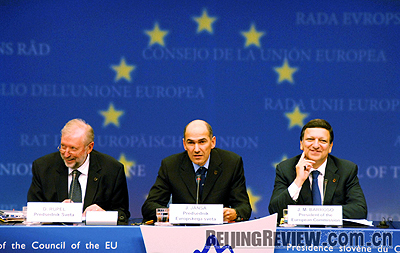|
Ireland has a fairly low tax rate among all EU members, which is advantageous to attract foreign investment. Further European integration can generally lead to a standard tax rate, which will result in Ireland losing its edge. In addition, the domestic situation in Ireland affected the result of the referendum. In May, former Irish Prime Minister Bertie Ahern stepped down because of a financial scandal, which decreased government authority and increased the opposition's influence. Before the referendum, the opposite party, Sinn Féin, called on the Irish Government to re-negotiate with the EU about the Lisbon Treaty, so as to get immunity in the same way Britain did.
Ireland's veto of the Lisbon Treaty reminded people of France and the Nederlands vetoing the EU Constitution in 2005. There were some similarities between the two issues. For example, the main reason that France disapproved the EU Constitution was that the French people were angry about their economic situation, and they worried that further enlargement of the EU would lessen their job opportunities inside France. The Dutch mainly were afraid of an influx of immigrants, which might worsen existing racial tension in the country.

NOT GIVING UP: The EU Summit holds a press conference on June 20 in Brussels, declaring that the Lisbon Treaty impasse will be discussed in October
The fact that the two treaties were vetoed one after another shows that there is a big difference between the perspective of the European political elites and the grassroots toward the integration process. The former believes that accelerating integration is the only way to effectively cope with such difficult obligations as climate change, energy safety and the rapid development of emerging countries, thus it is making all efforts to push forward regional integration. In the meantime, many people find it difficult to understand the overstaffed and bureaucratic EU machine. They also believe politicians failed to listen to their suggestions when pushing forward integration.
|
